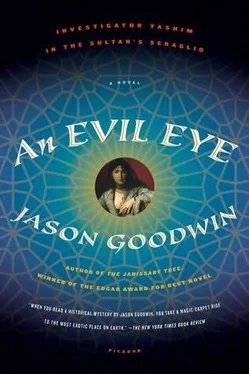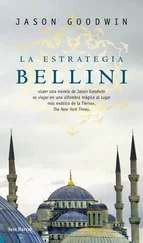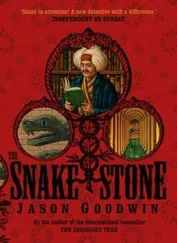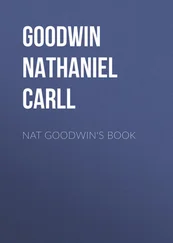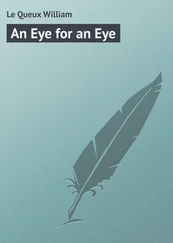Jason Goodwin - An Evil eye
Здесь есть возможность читать онлайн «Jason Goodwin - An Evil eye» весь текст электронной книги совершенно бесплатно (целиком полную версию без сокращений). В некоторых случаях можно слушать аудио, скачать через торрент в формате fb2 и присутствует краткое содержание. Жанр: Исторический детектив, на английском языке. Описание произведения, (предисловие) а так же отзывы посетителей доступны на портале библиотеки ЛибКат.
- Название:An Evil eye
- Автор:
- Жанр:
- Год:неизвестен
- ISBN:нет данных
- Рейтинг книги:3 / 5. Голосов: 1
-
Избранное:Добавить в избранное
- Отзывы:
-
Ваша оценка:
- 60
- 1
- 2
- 3
- 4
- 5
An Evil eye: краткое содержание, описание и аннотация
Предлагаем к чтению аннотацию, описание, краткое содержание или предисловие (зависит от того, что написал сам автор книги «An Evil eye»). Если вы не нашли необходимую информацию о книге — напишите в комментариях, мы постараемся отыскать её.
An Evil eye — читать онлайн бесплатно полную книгу (весь текст) целиком
Ниже представлен текст книги, разбитый по страницам. Система сохранения места последней прочитанной страницы, позволяет с удобством читать онлайн бесплатно книгу «An Evil eye», без необходимости каждый раз заново искать на чём Вы остановились. Поставьте закладку, и сможете в любой момент перейти на страницу, на которой закончили чтение.
Интервал:
Закладка:
And yet-a bridge!
He looked up and, seeing a familiar figure approaching him across the planks, he raised a finger in the frosty air. “You see, Kadri,” he announced. “This bridge is already performing its essential function.”
Kadri looked surprised. He bowed. “I am very pleased to meet you here, Palewski efendi.” After a moment’s hesitation he added: “Its essential function?”
“Yes. I was thinking, a bridge is a forced marriage, if you like. Istanbul and Pera clapped together. Pompous groom. Reluctant bride.”
“But which is which?”
Palewski shook his head. “It’s not altogether like that, Kadri. I see it now. Not a marriage at all. The bridge,” he added, with an air of serious triumph, “is a trysting place.”
Kadri looked expectantly at the older man, and said nothing.
“A trysting place, Kadri. Where the lovers meet.”
“I see,” the boy said doubtfully.
“Not lovers in the literal sense, of course.” He waved his hand. “Air of license. Ladies out for a walk. Pashas saluting. Hobbling Sufis and swaggering tars. Jolly fellows all about. Everyone cheerful and bright-eyed, somehow. You know what it reminds me of? You should know.”
Kadri looked round pensively. “The theater?”
“Intelligent boy. Forget your ragged crew, all that paint and declamation. This is the real theater in Istanbul. Long may it last!”
Kadri raised his arm and pointed. “Here comes Yashim efendi!”
106
The man with the knife stood in the low doorway of the caravansary, rubbing his chest.
He had hoped the welt would fade; it was less than a scratch, after all, the skin scarcely broken, and there had been no blood. But it did not fade. It felt hot, instead, and around it the skin was flushed. In the mornings, when he moved his arms, the welt was sore.
The guardian of the caravansary received him doubtfully. He was not a merchant, with goods to protect; nor did men wander at this time of year, looking for work.
“Three days,” he said reluctantly. “Three days, then you’ll move on, see?”
For a day and a night the man slept, feverishly. On the second day he showed the guardian his wound.
A doctor was fetched. He frowned at the scratch, and prepared a hot poultice to draw the poison out.
But the man knew what happened when a mad dog bit you and drew blood. It could be weeks, or months, but in the end you went mad, too, and died.
The pasha’s life hung by a tiny thread.
He had so very little time.
107
Yashim walked with his head down, lost in the crowd and oblivious to the great stream of humanity that swirled around him as he descended to the shore of the Golden Horn.
“Fine times, efendim! It’s our work, every inch-and every inch will get you closer! Bring the ladies! All safe, all sound!”
Beside him, men were shouting and laughing.
Yashim heard their words and saw their happy faces, but he made nothing of it. He could not rid himself of the possibility that Hyacinth had taken his own life. He may have slipped on the ice and overbalanced. He was an old man, after all. But he had asked, “Is it true?” Yashim had said that yes, he believed it to be true: the valide would be moving to Besiktas. And Hyacinth might not be going.
The memory turned like the wheels of the cart that Yashim was following at a cautious distance, to avoid the splash as it lurched into a puddle of dirty water freckled with recent snow. The cartwheels bounced, and began to drum as if they were running over the deck of a ship.
The traffic was busier than usual: he’d never seen or heard so many carts and porters scurrying about here on a winter’s evening.
He hunched his shoulders against the wind, and looked up for a caique.
Hyacinth fell, he repeated to himself. Hyacinth fell against the palace balustrade, in the snow.
He blinked and looked around. He saw a balustrade beside him: higher, perhaps, and made of wood.
“Try it, efendim! No charge-Pera to Istanbul!”
Happy men were standing in a knot, urging people on with their arms.
Yashim took a step forward. He glanced down, astonished to see his feet planted on wooden planks. All around him was a seething mass of people, laughing and pointing, dodging the carts that thundered across the planks.
He stopped. An old man was coming toward him, planting his stick carefully on the boards, grinning and nodding.
“See that, efendi! See that! Don’t be afraid. I did it with my stick-seventy years I’ve waited for this day! Never left Stamboul before. Free! It’s free!”
A ragged-looking man with a shock of corkscrew hair shot through the crowd. He was barefoot, and intent, and he carried a small bag in his fist.
The crowd parted automatically to let him through, and through the gap Yashim recognized two familiar faces.
They swept him up, arm in arm.
“I was just telling our young friend, Yashim, that the bridge is a splendid piece of theater. Istanbul meets Pera-the old empire and the new Europe! Preen should mount a tableau.”
Yashim said nothing. Only when they had stepped onto land, and were at the bottom of the steps that led to the Galata Tower, did he stop and turn, looking back at the bridge. He shook his head. “Our navy,” he said at last. “Do you know what it amounts to? Almost nothing. A few ships of the line, ill-trained crews, foreign officers. Our navy is an illusion-a costly one, for us. The grand vizier thinks that it can stop the Russians. It can’t.”
“Not when it’s in Alexandria, certainly,” Palewski said drily.
“No-never. It’s not our style-we’re afraid of the sea. Look at Husrev Pasha. He’s an old Bosniac-what does he know of the sea? We’ve had two great engagements in the last few hundred years, and we lost them both. Lepanto, 1580. Wiped out. Navarino, 1827. Total collapse of the fleet.”
“‘God gave the land to the Turks, and to the Christians he gave the sea.’ I know the saying.”
They began to climb the Pera steps. “It’s the sea that counts, these days,” Yashim said. “We built our empire by land-because our cavalry was faster than the rest, and because we knew how to govern. All that has changed. It’s ships that matter, in trade and war. With ships you can conquer distant lands, like the British in India. On land, nothing much has changed. But you can bombard a city from the sea-guns, men, drawn anywhere in the world at an instant.”
“Istanbul has never been so vulnerable, that’s true.”
“That, too. When Mehmet the Conqueror took the city from the Greeks, he had one huge cannon dragged over the mountains to the city walls. And he attacked by land.” He swept an arm across the panorama. “Today, battleships could reduce Istanbul to rubble in a few days.”
“I had no idea you were such a strategist, Yashim.”
“I’m not. I’ve been thinking, though. For fifty years or more, the empire has been crumbling around the edges. Losing possessions to Russia on the Black Sea. Losing ground to Egypt in the south. It’s been like watching a bear attacked by dogs. In the end, the dogs will always win.”
“Decline, decline.” Palewski shrugged. “All empires, in the end, are doomed to fall.”
“Naturally-unless they receive unexpected aid.”
“Quite. But the Ottomans, as I’ve mentioned, don’t have powerful friends.”
“No-until now, we’ve simply managed our own decline, alone.”
They passed below the Galata Tower.
Palewski’s eyes narrowed. “What do you mean, until now?”
“It was what you said about the bridge that made me see it. Europe comes to Istanbul, is that what you said? For fifty years we’ve been clamped in a pincer between Russia and the Egyptians-and when the Greeks sought independence, the British and the French made sure they got it, too. No, we don’t have friends. We don’t even have an alliance of interests.”
Читать дальшеИнтервал:
Закладка:
Похожие книги на «An Evil eye»
Представляем Вашему вниманию похожие книги на «An Evil eye» списком для выбора. Мы отобрали схожую по названию и смыслу литературу в надежде предоставить читателям больше вариантов отыскать новые, интересные, ещё непрочитанные произведения.
Обсуждение, отзывы о книге «An Evil eye» и просто собственные мнения читателей. Оставьте ваши комментарии, напишите, что Вы думаете о произведении, его смысле или главных героях. Укажите что конкретно понравилось, а что нет, и почему Вы так считаете.
